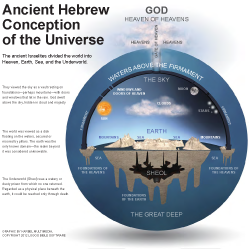7:2 seven pairs There is a discrepancy between this figure and the instructions of 6:19–20, which speak of one pair of each species rather than seven. Genesis 6:19–20 may speak of a single pair as the minimum number of animals needed to continue the species after the flood, whereas vv. 2–3 includes additional clean animals to ensure that proper sacrifice can be made after the flood.
clean animals The clean and unclean distinction for sacrifice is made explicit only with the law, long after Noah (Exod 20; Lev 11; Deut 14). However, there may have been an earlier awareness of animals that were appropriate and inappropriate for sacrifice. Alternatively, a later editor may have added this detail to remove potential contradictions with the law.
distinction for sacrifice is made explicit only with the law, long after Noah (Exod 20; Lev 11; Deut 14). However, there may have been an earlier awareness of animals that were appropriate and inappropriate for sacrifice. Alternatively, a later editor may have added this detail to remove potential contradictions with the law.
7:4 seven days Presumably the time needed for the animals and humans to board the ark. Seven-day periods are noted elsewhere in the story (Gen 7:10; 8:10, 12).
7:7 Noah and his sons Eight people—four married couples—are saved from the flood (compare 6:18).
7:10 seven days The flood came on schedule, just as God had said. See v. 4 and note.
7:11 the six hundredth year See note on 5:5.
the seventeenth day of the month Throughout chs. 6–8, the narrative offers multiple numbers relating to how much time has passed—it is often difficult to tell how these figures relate. This may suggest that Genesis was originally composed of multiple sources. Alternatively, there may be two systems of recording time in the narrative, one that linearly presents the days and what developed during various time spans and the other designating exact dates.
the springs of the great deep This description presumes an ancient Near Eastern cosmology (worldview). This worldview included a domed firmament (or vault) above the visible sky that held back waters that were above the firmament and below the earth. The waters below were called the great deep. It was believed that the waters came to earth (when it rained) through gaps in the firmament—the windows and doors of heaven (compare 1:6 and note).
7:12 forty days and forty nights This may be an idiom for a long period of time and not a description of a precise length of time (compare Exod 24:18; 1 Kgs 19:8).
7:13 Shem, Ham, and Japheth See note on Gen 6:10.
7:16 Yahweh shut the door behind him Yahweh’s role in saving Noah, his family, and the animals comes into full view here. The narrator reminds the audience that the salvation of these few people is an act of divine grace.
7:17 flood came forty days See note on v. 11.
7:19 all the high mountains which were under the entire heaven This description and vv. 20–23 may support the idea that this narrative presents a global flood—and perhaps even demand it. In addition, the nt uses the flood account as an analogy for the future judgment of all of humanity (2 Pet 3:6–7). On the other hand, extrabiblical evidence for a global flood is inconclusive. Arguments for both a local and global flood can be supported biblically (see note on Gen 6:17; note on v. 21).
 The Extent of the Biblical Flood
The Extent of the Biblical Flood
7:21 every living thing that moved on the earth perished In Biblical usage, phrases that appear on the surface to be universal do not always speak of exhaustive, universal participation—particularly with respect to peoples and lands on the other side of the globe from the ancient Near East (e.g., 8:6–7; 41:57; 2 Sam 15:23; 1 Chr 14:17; 2 Chr 9:28).
7:22 the breath of life The Hebrew phrase used here, nishmath-ruach chayyim, often translated “breath of life,” may be literally rendered as “the breath of the spirit of life.” The Hebrew here refers to animate life—humans and animals. Compare 2:7 and note.
7:23 he blotted out Refers to erasing something completely, often with water. See note on 6:7.
7:24 waters prevailed over the earth one hundred and fifty days See note on 8:3.

|
About Faithlife Study BibleFaithlife Study Bible (FSB) is your guide to the ancient world of the Old and New Testaments, with study notes and articles that draw from a wide range of academic research. FSB helps you learn how to think about interpretation methods and issues so that you can gain a deeper understanding of the text. |
| Copyright |
Copyright 2012 Logos Bible Software. |
| Support Info | fsb |
 Loading…
Loading…


